Getting started with Accounts Payable: Accountant
Accountants have access to view and export all accounts payable components. They can read and export budgets, bills, POs, credit notes, reports, transactions, and ledgers.
This guide is divided into below sections (recommended to go through it in this flow):
- How to set up approval policies?
- How to view budgets?
- How to view vendor details?
- How to create PRs/ PQs/ POs?
- How to manage bills?
- What are custom fields?
- How to manage my approvals?
- How to view credit notes?
- How to view receipt note?
- How to view accounts payable Reports?
- What is AP Dashboard?
- How to check accounting?
Approval Policies
Users with accountant role can manage approval policies.
Setting up approval policies is one of the first steps toward setting up your payables account in Peakflo.
1. In your dashboard, click 'Settings' from the left navigation menu and go to 'Approval policies'. 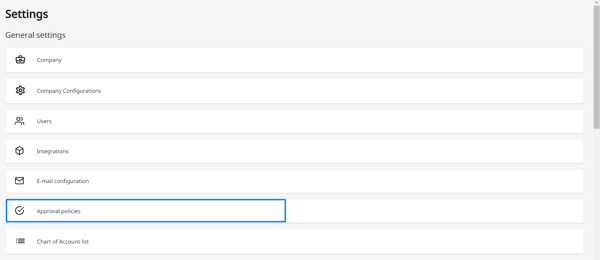
2. Click on the Add New button.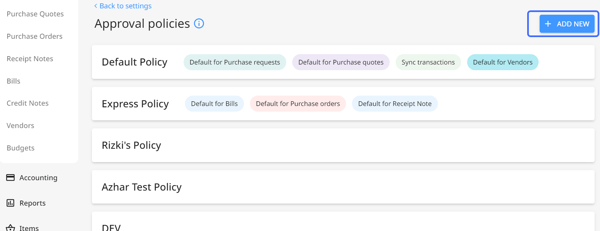
3. The approval policy box will appear. Add the name of the policy and simply tick any of the boxes to configure whether you want to apply the policy for Purchase Requests, Purchase Quotes, Purchase Orders, bills, transactions, receipt notes, vendors, or all of them!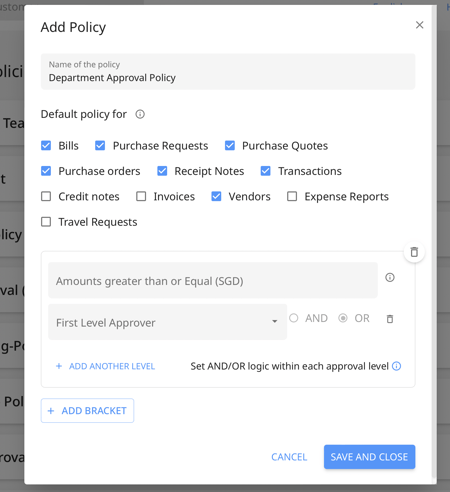
4. Then, you can set the amounts, assign multi-level approvers in your organization, or add more brackets to extend your policy.
What are approval levels?
Approval levels are where you can add multiple layers of approval for the bill payment. For example, you can add team member 'A' as the first-level approver. Once approved by team member 'A', it will pass on to the second level approver, team member 'B'. This helps refine the review process of all the bills before pushing them for payments. To cater to the most complex requirements. Peakflo can support up to 10-level approvals
What are approval brackets?
Approval brackets allow you to add more approval layers when more money is involved. For example. You can set an approval bracket of value between $0- $100 for auto-approval, $100-$1000 to a manager, and anything above $1000 to the director. This helps in bringing in the right stakeholders to review and approve high-value bills.
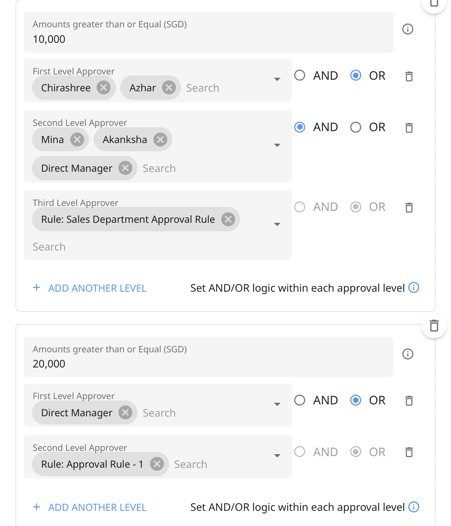
In the approval levels, you can add users, the Direct Managers, and also add approval rules.
If you want to accommodate approvals for different departments and business units, take advantage of rules for easier management.
By adding multiple rules to an approval level, the approval policy will automatically branch off to route to the right approval rules.
You can add multiple levels of approvals and multiple approvers in each level too.
You can set AND/OR logic within each approval level:
- AND: All approvers within the level must give their approval. This means that for a request to proceed to the next level of approval, every approver assigned to that specific level must provide their approval.
- OR: Any one of the approvers within the level can approve the request. This means that as soon as one approver gives their approval, the request can move forward to the next level without waiting for all approvers to respond.
5. Once you've filled in all the details and added the team members in different approval levels, click Save and Close to set your approval process live.
Different levels of approval along with the people responsible for the approval are visible on individual bill/PQ levels. This is what we call the audit trail.
.png?width=450&height=535&name=pasted%20image%200%20(1).png)
Configure the types of approval emails notifications
To avoid spam and facilitate clearer communications, you can set the types of emails that you'd like Peakflo to send to the internal teams.
As usual, go to ⚙️ Settings and go to Users. Click on the user whose notification settings you'd like to edit.
Click the Notifications page in the user pop-up, and tick any of the boxes regarding which type of approval emails or WhatsApp notifications - or even other kinds of notifications - for the users to receive.
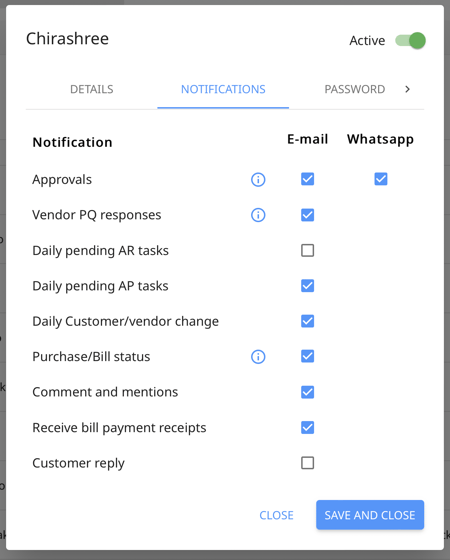
When a bill/PQ/transaction is pending on someone’s queue, they get 2 types of notification:
- Immediately when the PQ/bill/transaction enters their queue
.png?width=450&height=525&name=pasted%20image%200%20(3).png)
- Start of the day as part of their daily briefing email
.png?width=450&height=545&name=pasted%20image%200%20(2).png)
Budgets
Accountants are restricted to access budget creation, budget editing, or budget approval. They have access to view the budgets of which they're members.
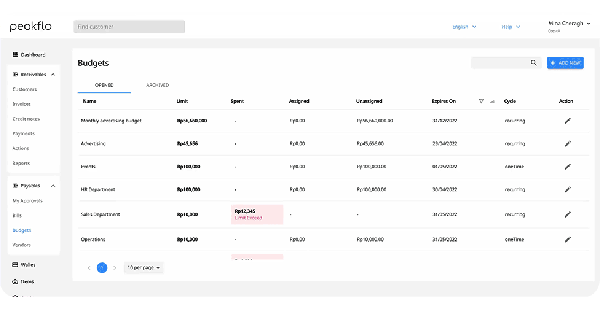
Accountants can select the budget category while creating PR/PQ/PO/Bill.

Vendor
Accountants have access to view all vendor details such as company information, timeline, and contacts.

Vendor details have a 2-way sync between Peakflo and your accounting system. All vendors created in your accounting system will be present in your Peakflo account and vice versa. The synchronization happens every 5 mins.
The vendor timeline highlights all actions carried out, including the status of the corresponding bills. To access a certain vendor timeline, click on any vendor name.
.png?width=600&height=267&name=pasted%20image%200%20(4).png)
Accountants can also invite vendors to the Vendor Portal.

Purchase Request/Quote/Order
Accountants have access to view and create all PRs/PQs/POs.
If you want to know more about how to create PRs/ PQs, check out:
- How to create a purchase request and send it for approval?
- How to create purchase quotes and send them for approval?
Here is an walkthrough of PQ creation, in a similar way PRs can be created too.
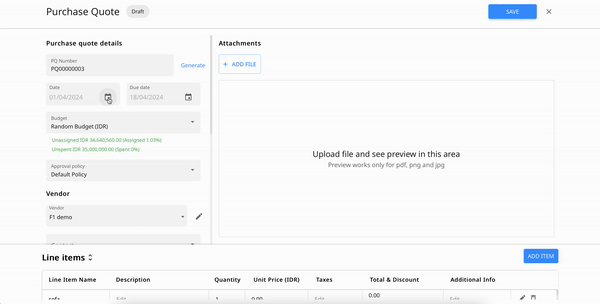
Accountants can also directly send the purchase quotes, once approved, via mail or WhatsApp to the corresponding vendors' contacts. Simply select the contacts to send the PQ to along with their corresponding communication channel.
Do not forget to also tick "Automatically send to the vendor after full approval"!
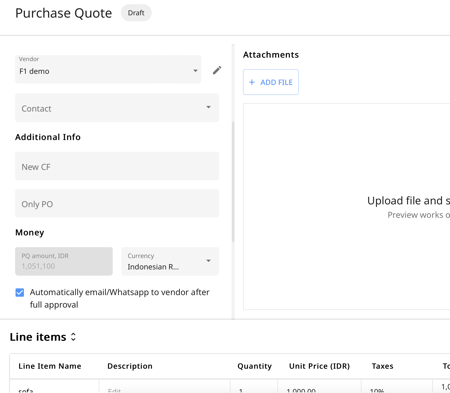
When the PQ is fully approved, the same document transforms into PO automatically by clicking on the "Create PO" button.

Additionally, POs can be mass uploaded to Peakflo. Check out this article for more details: How to mass upload purchase orders?
If your Peakflo account is integrated with an accounting system, we sync all your POs created in Peakflo into your accounting system. Learn more about how the data flow works on the Integrations page.
Once a PO gets full approval, it will show up in the Purchase Orders section, under the Approved-open column.
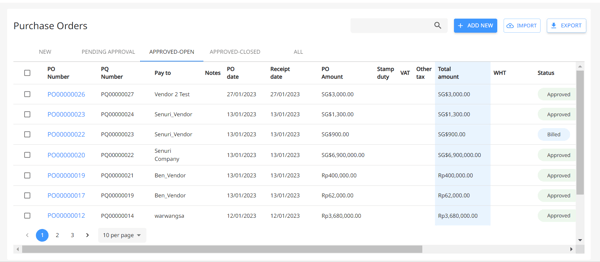
When the PO amount matches with 1 or multiple bills, the PO goes to the Approved-closed state AKA completely billed.
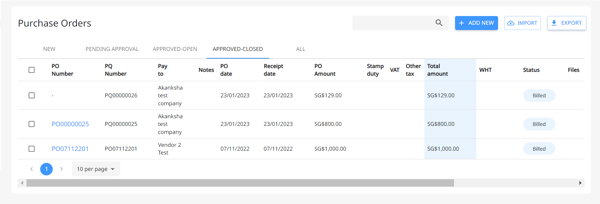
Similar to vendors, Peakflo also tracks any changes to PR/PQ/PO and captures them in the timeline. Simply go to Purchase Requests and click on any PRs or PQs or POs you'd like to see. Accountants can view the entire history of the PQ/PO using the PO/PQ timeline.
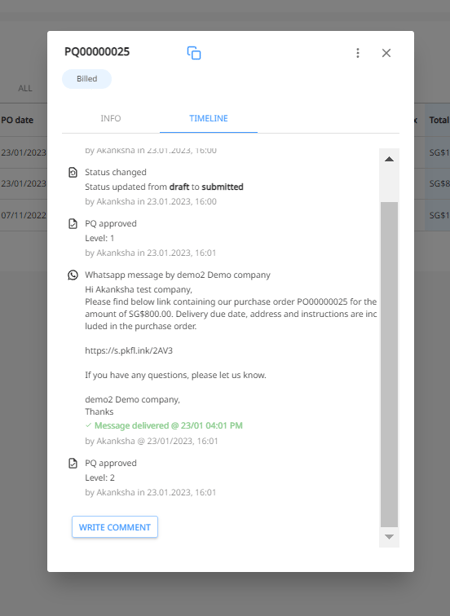
Bills
Accountants have access to view, create, edit snd delete bills.
You can also mass upload bills to Peakflo (in case you're not connected to accounting software).
To know more about mass upload or manual creation of bills (in case not connected to accounting software), please visit our help portal on how to create and upload bills.
Bills can also be automatically scanned using our OCR system. Vendors or Peakflo users can directly send the bill copy to our OCR mailbox. Peakflo automatically scans bill details with a high-level accuracy and saves them without any manual data entry. Sample mailbox details are mentioned below:
-gif.gif?width=600&height=284&name=users-can-access-the-email-to-send-bills%20(1)-gif.gif)
📘 Learn: How does OCR work?
If your Peakflo account is integrated with the accounting system, we will sync all the bills created in Peakflo to your accounting system. The synchronization happens in twice:
- When the bill is fully approved
- When a bill is paid and the corresponding transaction is fully approved
To create a bill from scratch, go to the "Bills" tab under the "Accounts Payable" section and click on "Add New".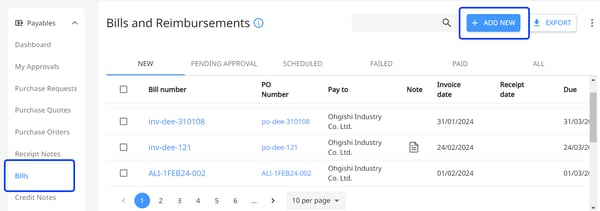
Add the information in the bill edit form and don't forget to match the bill with a PO by clicking on the "Match PO" button.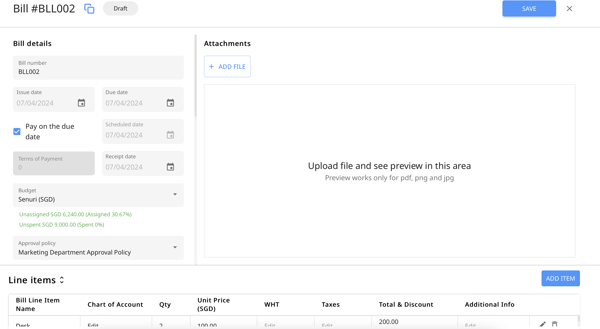
📘 Read:
Accountants can also add and edit bill line item details and tax details.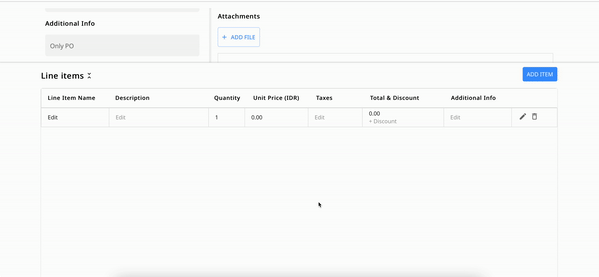
Recommended Reads:
Similar to the PO timeline, Peakflo also captures bill history in its timeline. Go to the Bills section and click on the bill you'd like to see the details.

We can even automate payments if you've enabled Peakflo wallet. Once the bill receives full approval, it goes to the scheduled state. On the bill's due date, payment will automatically be paid with the Peakflo wallet.
We keep the finance team and bill creator, updated with the details of the payment which can be found in the following email notifications:
- When a payment is successful:
.png?width=450&height=497&name=pasted%20image%200%20(8).png)
2. When a payment is failed:
.png?width=450&height=507&name=pasted%20image%200%20(9).png)
3. When the wallet is low on funds:
.png?width=450&height=499&name=pasted%20image%200%20(10).png)
So you don't have to worry about vendor payments, Peakflo's got your back! 💙
Custom fields
Accountants can see the custom fields mapped to bills/PRs/PQs,POs in the table view and edit in their edit forms.

Learn more about custom fields here: What are custom fields?
My Approvals
This is the section where all bills/PRs/PQ/POs/transactions pending with the approvers are shown. When approval items come to the user’s queue, they can receive notifications by Whatsapp or email. Users can approve, decline, or change the status to draft.
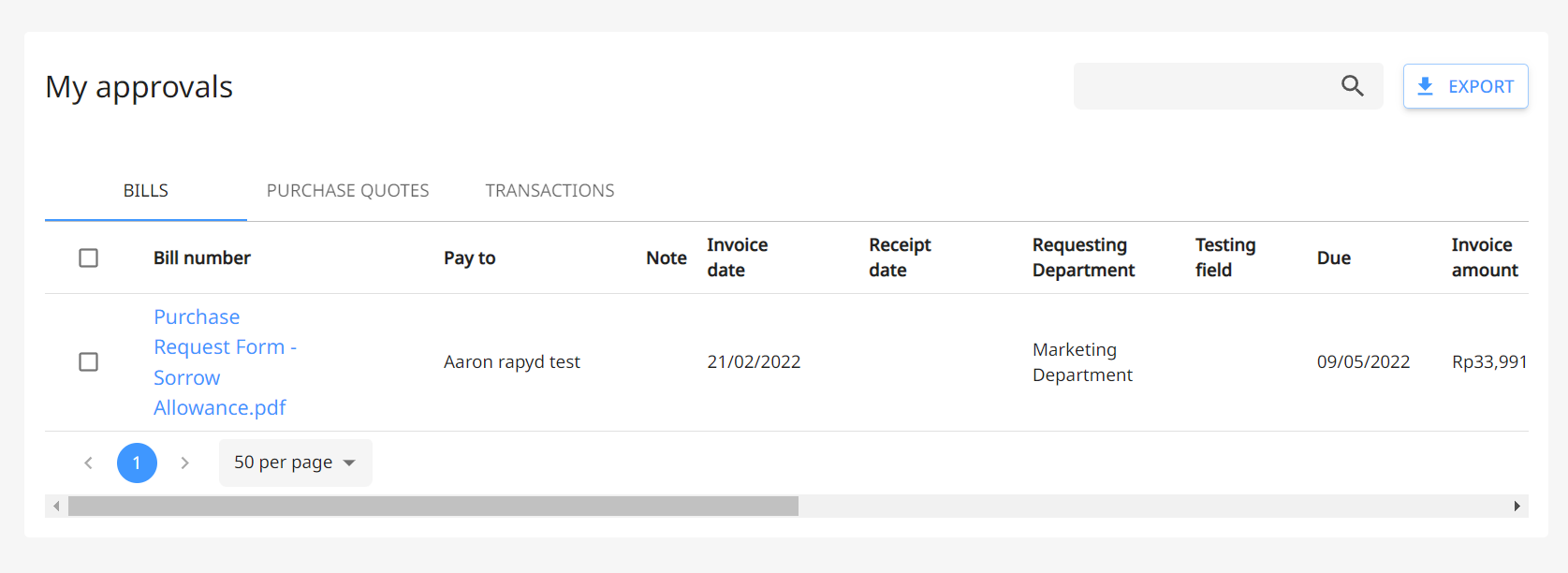
With these approvals, users can add comments and also mention other users to highlight changes or for audit purposes. Mentioning a user will enable view permissions of the bill/PO to that user.
.png?width=600&height=400&name=pasted%20image%200%20(16).png)
Important Note
When adding "@mentions" in the comments, if you want to send the notification to bill creator and bill viewer along with the mentioned user then check the box "Notify creators and Viewers".
- Bill creator is the user who created the bill.
- Bill viewers are:
- All bill approvers are added as bill viewers
- Default viewers from vendors are added as bill viewers
- Anyone mentioned in the bill is added as a bill viewers
- Rules can add bill viewers
- If the user is a budget admin, then the user is a bill viewer
If you don't want bill viewers and creators to get notified and only want the person whom you have mentioned to get the comment, you need to untick the box "Notify creators and Viewers" before clicking on "Write Comment".
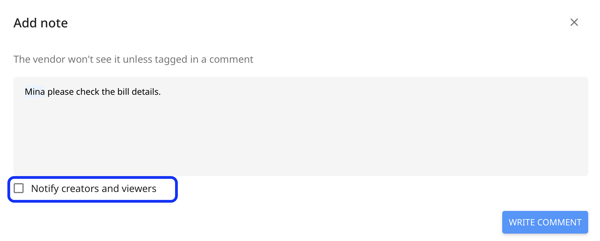
This page is mobile optimized so users can view attachments and approve bills/POs right from their fingertips.
-gif.gif?width=450&height=351&name=WHATS-NEW-DEC-22_access-all-approvals-from-the-tip-of-the-palm%20(1)-gif.gif)
The notification settings can be accessed from Settings. Click on Users and select your user name then go to the Notifications tab.
.png?width=450&height=537&name=pasted%20image%200%20(17).png)
Credit Notes
Accountants have access to view credit notes tagged to bills.
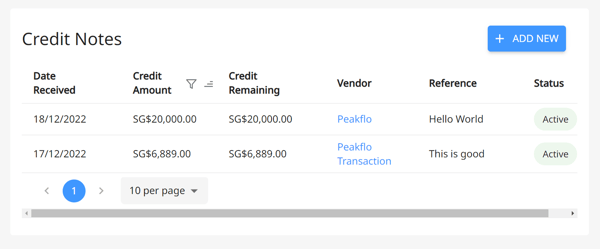

Receipt Notes
Accountants have access to view receipt notes tagged to bills.

Reports
Following are the reports in the Payables module:
- Change log report. This report highlights any changes done to the vendor/bill/PO details. It captures the fields changed along with the owner of the changes. Peakflo also shares an end-of-day email notifying users about the latest 5 changes made. This is to ensure that transparency is maintained along with the full audit log.
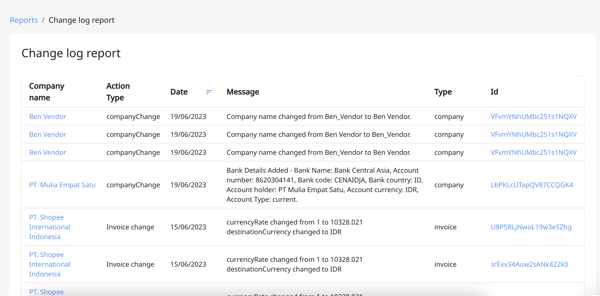
- Aging payables report: Admins have access to view and export the aging payables report. An accounts payable aging report is a critical accounting document that summarises the bills and invoices owed by a business, broken down by vendor and due date. Aging involves categorizing your company’s unpaid customer invoices and credit memos by date range. The report can be seen in a 15 days or 30 days period past the due date.
.png?width=600&height=287&name=pasted%20image%200%20(19).png)
If you have a presence in multiple countries, we will show a summary of pending payables per vendor and per currency.
.png?width=600&height=121&name=pasted%20image%200%20(20).png)
Dashboard
The dashboard shows the following 3 items:
- AP pending actions in the Peakflo account
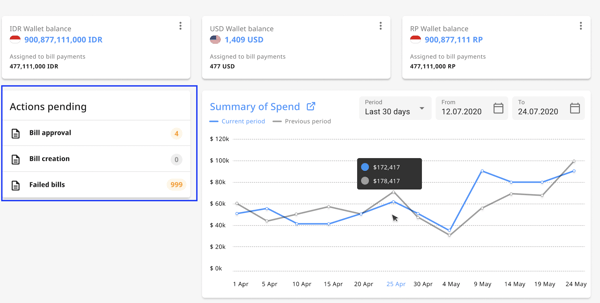
- List of AP Wallets with currency and current balance. Admins have access to top-up these wallets.

- Summary of spend in the selected period, which also shows the trend of payables in the past.
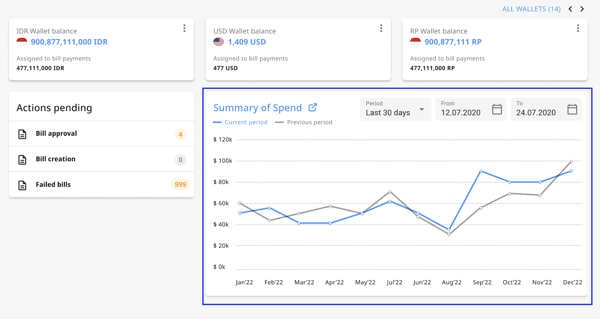
Accounting
This page contains all details associated with transactions and the ledger. All wallet transactions are detailed here: deposit, payout, top-up, payment, and transfer.
Transactions also go through the approval policies tagged to them. Admins can also export transaction and ledger tables. Transactions can be synced to your accounting system if there is an integration.
Transactions should typically be reviewed by the company's accountant before they are approved for synchronization. These transactions are akin to your bank transactions which will be reconciled in your accounting software with the corresponding account transactions, automatically by Peakflo.
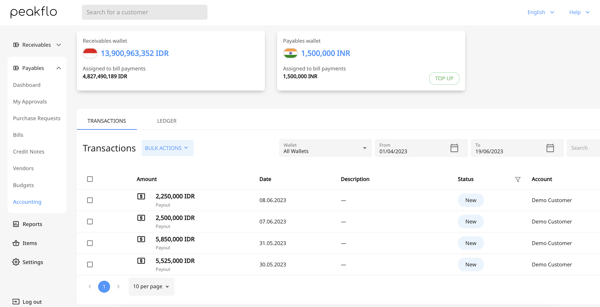
If you have queries about any module, feel free to contact your Peakflo partner or contact us at: support@peakflo.co